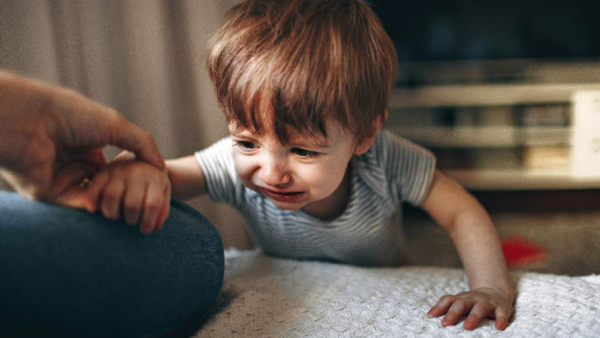
Parents want the best for their kids, and it’s hard to watch them struggle. It’s natural to want to step in the moment they have trouble tying their shoes, doing homework, or even pouring a cup of juice. After all, you’re supposed to be there helping them every step of the way, right?
Actually, no. According to Parent Focusan Instagram account with over 150,000 followers that shares parenting tips and family advice, you should aim to be your child’s anchor. Good parenting isn’t about doing everything for your kids or stepping in the moment they start to struggle. It’s about stepping back and giving them the space to figure it out on their own, intervening only when they truly need you. Parent Focus offered a list to help parents identify their own behaviors that could be a roadblock to their children’s development. They emphasized how common it is for parents to think that jumping in means showing love, because, in a way, it does. But nonetheless, real maturity is letting the little ones figure things out on their own.
Kamira | Shutterstock
It’s never easy to see your child in discomfort. Problem-solving can be tough at a young age, especially when kids haven’t fully developed their thinking skills. But that’s exactly why they need a chance to work through challenges on their own. When you constantly take charge, you’re stealing their confidence.
In a piece written for A Fine Parentteacher and mom Lauren Barrett explained, “Our children MUST learn how to be resilient in order to find success and overcome the obstacles they will face as a human. If we sweep in to save our children from every bit of difficulty, we actually do them a disservice. We send the message that when life gets tough, someone will always help you out of it, and that failure is a scary and negative thing.” She went on to write, “one of the best things we can do for our children is to allow them to struggle, as it provides the chance to reframe failure.”
: Parents Whose Kids Feel Safe Telling Them Everything & Anything Did These 8 Things Right
Let your child make mistakes. If they come to you for advice, offer your insight, but don’t guide every single move they make. The little ones need to learn to trust themselves and develop a set of skills to decide whether an idea is worth pursuing.
Sometimes, the constant stream of guidance is labeled as Tiger Parenting. It’s basically a strict approach to raising kids in the hopes that they will have success both academically and professionally. Of course, who doesn’t want either of those things as a parent? The problem with this style of parenting is that kids are never allowed to make their own choices or fail in any endeavor. Both of those things are integral to independence.
According to VeryWellMindthese kids grow up to be adults who struggle with self-esteem issues, forming healthy relationships, and even self-regulation because they never relied on themselves. Their self-esteem is often low, and they live with the constant fear of making the wrong decisions that can often result in choosing no decision at all.
Let’s say it’s time to order ice cream at the counter. Why not let the kids order for themselves? They’re capable, but are you doing it simply because it’s easier? Every time you tell them to sit at the table while you order for them, their brain receives the message: “You’re not capable.”
Sure, when they tie their own shoes, it takes longer. When they pour their own juice, the likelihood that it will spill is greater. But without doing the thing, they become complacent. They become reliant. Most importantly, they stop trusting in their own ability.
: Doorbell Cameras Have Quietly Robbed Kids Of An Important Part Of Childhood, Says A Parenting Expert
In a recent article on CNBCclinical psychologist Judith Locke highlighted a parenting mistake called “extreme responsiveness.” It happens when parents do everything they can to ensure their kids are enjoying themselves at all times, avoiding discomfort at all costs.
For instance, Locke emphasized that good parenting includes letting children be bored during school holidays. Boredom allows them to rest, wonder, and tap into their imagination. Filling up all their free time with activities can lead to overstimulation and disrupt their essential break.
 ANNA GRANT / Shutterstock
ANNA GRANT / Shutterstock
Believing everything a child says is another behavior parents need to watch out for. If your kid comes home and says, “I got a detention I didn’t deserve,” do you immediately trust them? If you do, you’re telling them that their perspective is always the correct one, which isn’t true. That mindset can become a barrier for them later in life when they’re faced with real accountability.
The reality is, sometimes you have to let your child struggle. It’s in those, “What do I do now?,” moments that their problem-solving skills begin to form. That spark of independent thinking helps them find a solution, and from that point on, they’ll face the next challenge with more confidence. They’ve been there before; they know what to do.
It’s with good intentions that you try to help your kid, and there’s nothing wrong with that. You want to protect them, fix problems, and keep them happy. It’s only natural. But one day, they’ll be on their own, making decisions without you by their side. Will they know how? That’s why learning to face challenges alone, at a young age, is essential for future success.
: Having This Many Kids Is The Least Stressful, According To Research
Matt Machado is a writer studying journalism at the University of Central Florida. He covers relationships, psychology, celebrities, pop culture, and human interest topics.